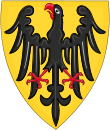Roman-German Emperor
| Emperor of the Holy Roman Empire |
|
|---|---|
|
Imperial
|
|

Reichsadler (Imperial Eagle) used by the emperors
of the high medieval period |
|

Double-headed Reichsadler used by the Habsburg emperors of the early modern period
|
|
| Details | |
| Style | His Imperial Majesty |
| First monarch | Charlemagne |
| Last monarch | Francis II |
| Formation | 25 December 800 |
| Abolition | 6 August 1806 |
| Appointer | see Coronation of the Holy Roman Emperor |
| Pretender(s) | Position abolished |
The Holy Roman Emperor (historically Romanorum Imperator "Emperor of the Romans") was the ruler of the Holy Roman Empire.
The title was held in conjunction with the rule of the Kingdom of Germany.
From an in Carolingian times the title evolved into an elected monarchy chosen by the prince-electors. The Holy Roman Emperor was widely perceived to be the deputy of Jesus Christ on Earth by Roman Catholic rulers in Europe, and he often contradicted or rivaled the Pope, most notably during the Investiture controversy. In theory, the Holy Roman Emperor was primus inter pares (first among equals) among other Catholic monarchs. In practice, a Holy Roman Emperor was only as strong as his army and alliances made him.
After the Reformation, many of the subject states in Germany turned Protestant while the Emperor continued to be a Roman Catholic. Until the Reformation, the Emperor elect (imperator electus) was required to be crowned by the Pope before assuming the imperial title. Various royal houses of Europe, at different times, became hereditary holders of the title. In particular the Habsburgs kept the longest possession of the title. The Holy Roman Empire was dissolved by Francis II, Holy Roman Emperor as a result of the collapse of the polity during the Napoleonic wars.
...
Wikipedia
